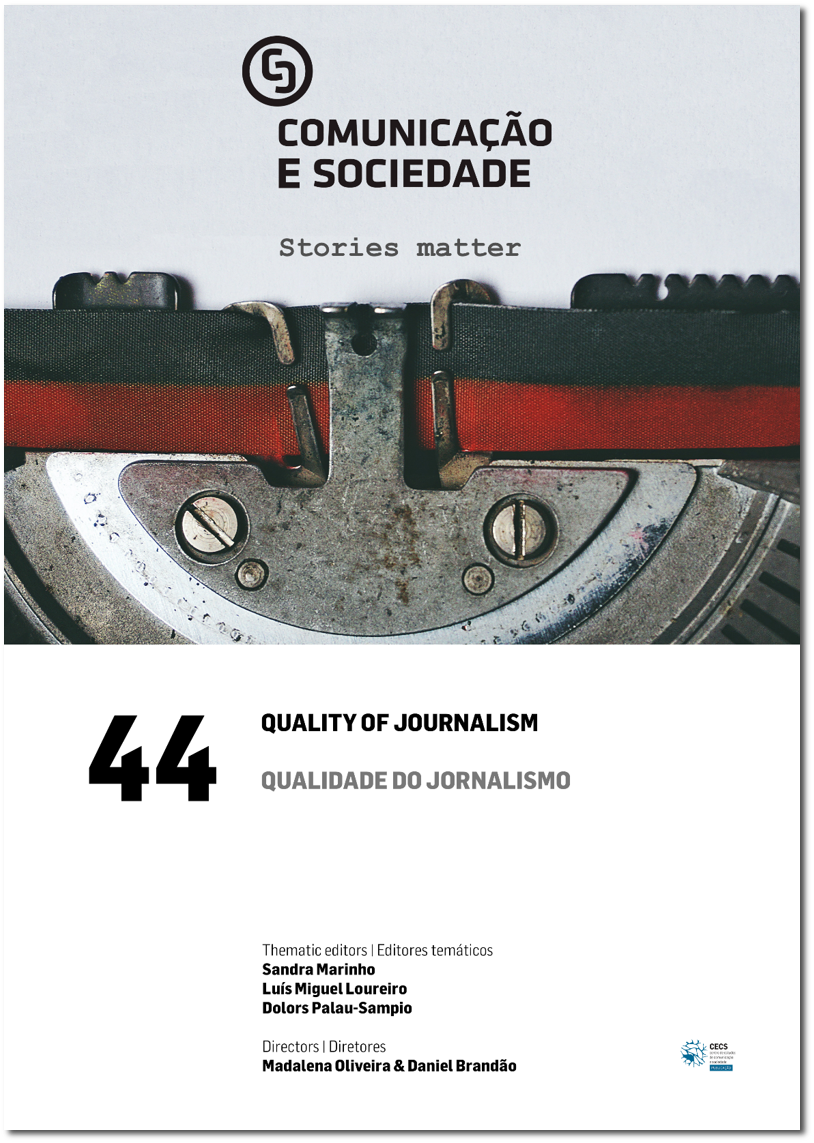Bibliometric Study on Quality Journalism in the Scopus Database: Evolution of the Topic and Characteristics
DOI:
https://doi.org/10.17231/comsoc.44(2023).4751Keywords:
journalism quality, Scopus, bibliometric study, content analysisAbstract
This article uses a term search to describe how academic work on the relationship between journalism and quality has evolved. It relies on a bibliometric study and content analysis of the Scopus database. Using the VOSviewer tool, this article presents automated analyses of the Scopus system and network maps that pertain to article terms. The goal is to outline scientific production’s features and the impact of research on quality journalism identifying emerging trends in this research area. The study sample consists of 971 research articles published between 1939 and 2022, specifically focusing on social sciences articles across various languages, indexed in Scopus.
The findings suggest a rising interest in journalism quality within analysed scientific journals, especially in the 21st century, predominantly in Western countries, despite a growing trend in Eastern countries. The United States is the primary source for articles, citations, and first authors. Additionally, the three journals publishing most on journalism quality are of Anglo-Saxon origin. Research clusters are developed on the object of study outside this axis, led by Spanish and Portuguese scientific production. The bibliometric analysis also shows the evolution of topics related to journalism quality.
Downloads
References
Benedeti, C. A. (2009). A qualidade da informação jornalística: Do conceito à prática. Insular.
Blumler, J., & Gurevitch, M. (2002). The crisis of public communication. Routledge.
Boczkowski, P. J. (2005). Digitizing the news: Innovation in online newspapers. MIT Press.
Bogart, L. (2004). Reflections on content quality in newspapers. Newspaper Research Journal, 25(1), 40–53. https://doi.org/10.1177/073953290402500104
Christofoletti, R. (2008). Implicações da concentração de mídia na qualidade do jornalismo: Ensaio de discussão e estudo de caso. Interin, 6(2), 1–15.
Dagger, R. (1997). Civic virtues: Rights, citizenship, and Republican liberalism. Oxford University Press.
Ferreira, O. C. A. (2011). Atributos de qualidade da informação [Dissertação de mestrado, Universidade de Brasília]. Repositório Institucional da UNB. https://repositorio.unb.br/handle/10482/9501
Harbers, F. (2016). Time to engage: De Correspondent’s redefinition of journalistic quality. Digital Journalism, 4(4), 494–511. https://doi.org/10.1080/21670811.2015.1124726
Jenkins, H. (2006). Convergence culture: Where old and new media collide. NYU Press.
Kovach, B., & Rosenstiel, T. (2021). The elements of journalism: What newspeople should know and the public should expect (4.ª ed.). Crown.
Lacy, S., & Rosenstiel, T. (2015). Defining and measuring quality journalism. Rutgers School of Communication and Information.
McQuail, D. (2010). McQuail’s mass communication theory. SAGE.
Meijer, I. C. (2001). The public quality of popular journalism: Developing a normative framework. Journalism Studies, 2(2), 189–205. https://doi.org/189205.10.1080/14616700120042079
Meijer, I. C. (2013). Valuable journalism: A search for quality from the vantage point of the user. Journalism, 14(6), 754–770. https://doi.org/10.1177/1464884912455899
Meyer, P. (2002). Precision journalism: A reporter’s introduction to social science methods. Rowman & Littlefield Publishers.
Pinto, M., & Marinho, S. (2003, 10–11 de abril). A qualidade em jornalismo: Problematização e operacionalização do conceito [Apresentação de comunicação]. I Congresso Luso-Brasileiro de Estudos Jornalísticos e ao II Congresso Luso-Galego de Estudos Jornalísticos, Porto, Portugal. https://hdl.handle.net/1822/997
Rosen, J. (2000). Questions and answers about public journalism. Journalism Studies, 1(4), 679–683. https://doi.org/10.1080/146167000441376
Salaverría Aliaga, R., García Avilés, J. A., & Masip Masip, P. (2010). Concepto de convergencia periodística. In X. López & X. Pereira (Eds.), Convergencia digital. Reconfiguración de los medios de comunicación en España (pp. 41–64). Servicio de Publicaciones e Intercambio Científico.
Sánchez, J. L. M. (2015). Emprendimiento e innovación en periodismo (Vol. 3). Ediciones de la Universidad de Castilla La Mancha.
Sharifi, A., Simangan, D., & Kaneko, S. (2021). Three decades of research on climate change and peace: A bibliometrics analysis. Sustainability Science, 16, 1079–1095. https://doi.org/10.1007/s11625-020-00853-3
Shoemaker, P. J., & Reese, S. D. (1996). Mediating the message: Theories of influences on mass media content. Longman.
Society of Professional Journalists. (2014). SPJ code of ethics. https://www.spj.org/ethicscode.asp
Tuominen, K., Talja, S., & Savolainen, R. (2005). Information literacy as a sociotechnical practice. The Library Quarterly, 75(3), 329–345. https://doi.org/10.1086/497311
Waltman, L., & Noyons, E. (2018). Bibliometrics for research management and research evaluation. Universiteit Leiden.
Weaver, D. H., & Wilhoit, G. C. (2020). The American journalist in the 1990s: US news people at the end of an era. Routledge. https://doi.org/10.4324/9781003064152
Downloads
Published
How to Cite
Issue
Section
License
Copyright (c) 2023 Luisa del Carmen Martínez García, Edson Capoano

This work is licensed under a Creative Commons Attribution 4.0 International License.
Authors own the copyright, providing the journal with the right of first publication. The work is licensed under a Creative Commons Attribution 4.0 International License.











